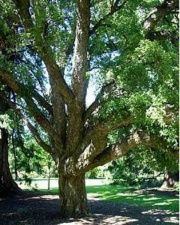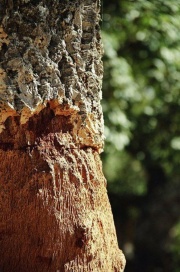Difference between revisions of "Cork oak"
Jump to navigation
Jump to search
| (2 intermediate revisions by 2 users not shown) | |||
| Line 1: | Line 1: | ||
| − | [[File:Cork_treef5.jpg|thumb|Cork oak | + | [[File:Cork_treef5.jpg|thumb|Cork oak ''Quercus suber'']] |
| − | |||
| − | ''Quercus suber'']] | ||
== Description == | == Description == | ||
A medium-sized evergreen oak, Quercus suber, native to the Mediterranean region. The cork oak is grown commercially for its thick, spongy bark. The [[cork]] is harvested every 10-12 years. The wood from the cork oak is too brittle for use. | A medium-sized evergreen oak, Quercus suber, native to the Mediterranean region. The cork oak is grown commercially for its thick, spongy bark. The [[cork]] is harvested every 10-12 years. The wood from the cork oak is too brittle for use. | ||
| − | + | [[File:corkoakf5.jpg|thumb|Cork oak ''Quercus suber'']] | |
== Synonyms and Related Terms == | == Synonyms and Related Terms == | ||
''Quercus suber''; Korkeiche (Deut.); alcornoque(Esp.); chêne-liège (Fr.); sûrier (Fr.); kurkeik (Ned.); sobreiro (Port.); sughera (It.); quercia da sughero (It.); cork tree | ''Quercus suber''; Korkeiche (Deut.); alcornoque(Esp.); chêne-liège (Fr.); sûrier (Fr.); kurkeik (Ned.); sobreiro (Port.); sughera (It.); quercia da sughero (It.); cork tree | ||
| − | + | == Physical and Chemical Properties == | |
| − | |||
| − | |||
| − | == | ||
| − | Medium sized tree growing to 20 m. Bark=very thick porous, light gray with deep reddish-brown furrows. Leaves = simple ovoid, dark green with wavy toothed edges. Fruit=narrow acorn with loose scaly cap, maturing every year. | + | * Medium sized tree growing to 20 m. |
| + | * Bark=very thick porous, light gray with deep reddish-brown furrows. | ||
| + | * Leaves = simple ovoid, dark green with wavy toothed edges. | ||
| + | * Fruit=narrow acorn with loose scaly cap, maturing every year. | ||
| − | == | + | ==Resources and Citations== |
* Michael McCann, ''Artist Beware'', Watson-Guptill Publications, New York City, 1979 | * Michael McCann, ''Artist Beware'', Watson-Guptill Publications, New York City, 1979 | ||
| − | * | + | * Virginia Tech Dendrology website at www.fw.vt.edu/dendro/dendrology/main.htm (accessed Oct. 8, 2005) |
| − | * Wikipedia | + | * Wikipedia: http://en.wikipedia.org/wiki/Cork_oak (Accessed Oct. 8, 2005) |
* ''Van Nostrand's Scientific Encyclopedia'', Douglas M. Considine (ed.), Van Nostrand Reinhold, New York, 1976 | * ''Van Nostrand's Scientific Encyclopedia'', Douglas M. Considine (ed.), Van Nostrand Reinhold, New York, 1976 | ||
Latest revision as of 12:29, 5 July 2022
Description
A medium-sized evergreen oak, Quercus suber, native to the Mediterranean region. The cork oak is grown commercially for its thick, spongy bark. The Cork is harvested every 10-12 years. The wood from the cork oak is too brittle for use.
Synonyms and Related Terms
Quercus suber; Korkeiche (Deut.); alcornoque(Esp.); chêne-liège (Fr.); sûrier (Fr.); kurkeik (Ned.); sobreiro (Port.); sughera (It.); quercia da sughero (It.); cork tree
Physical and Chemical Properties
- Medium sized tree growing to 20 m.
- Bark=very thick porous, light gray with deep reddish-brown furrows.
- Leaves = simple ovoid, dark green with wavy toothed edges.
- Fruit=narrow acorn with loose scaly cap, maturing every year.
Resources and Citations
- Michael McCann, Artist Beware, Watson-Guptill Publications, New York City, 1979
- Virginia Tech Dendrology website at www.fw.vt.edu/dendro/dendrology/main.htm (accessed Oct. 8, 2005)
- Wikipedia: http://en.wikipedia.org/wiki/Cork_oak (Accessed Oct. 8, 2005)
- Van Nostrand's Scientific Encyclopedia, Douglas M. Considine (ed.), Van Nostrand Reinhold, New York, 1976

